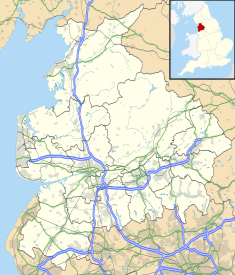
Bacup is a town in the Rossendale Borough in Lancashire, England, in the South Pennines close to Lancashire's boundaries with West Yorkshire and Greater Manchester. The town is in the Rossendale Valley and the upper Irwell Valley, 4 miles (6.4 km) east of Rawtenstall, 6 miles (9.7 km) north of Rochdale, and 7 miles (11 km) south of Burnley. At the 2011 Census, Bacup had a population of 13,323.

Rossendale is a local government district with borough status in Lancashire, England. Its council is based in Bacup and its largest town is Rawtenstall. It also includes the towns of Haslingden and Whitworth. The borough is named after the Rossendale Valley, the upper part of the River Irwell.

Hyndburn is a local government district with borough status in Lancashire, England. Its council is based in Accrington, the largest town, and the borough also covers the outlying towns of Clayton-le-Moors, Great Harwood, Oswaldtwistle and Rishton. The borough was created in 1974 and takes its name from the River Hyndburn. It had a population of 80,734 at the 2011 Census. Elections to the council are held in three out of every four years, with one third of the 35 seats on the council being elected at each election. Both the Conservative and Labour parties have controlled the council at different times, as well as periods when no party has had a majority.

Rawtenstall is a town in the borough of Rossendale, Lancashire, England. The town lies 15 miles north of Manchester, 22 miles east of Preston and 45 miles south east of Lancaster. The town is at the centre of the Rossendale Valley. It had a population of 23,000.
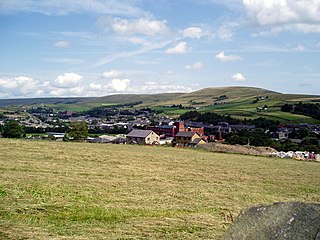
Whitworth is a town and civil parish in Rossendale, Lancashire, England, amongst the foothills of the Pennines between Bacup, to the north, and Rochdale, to the south. It had a population of 7,500 at the 2011 Census.

Rosso (Rossendale Transport Limited) is a bus operator providing local services in Greater Manchester, Lancashire and West Yorkshire, England. It is a subsidiary of Transdev Blazefield, which operates bus services across Greater Manchester, Lancashire, North Yorkshire and West Yorkshire.

Weir is a village to the north of Bacup in the Rossendale borough of Lancashire, England, and immediately south of the boundary with the Borough of Burnley. The village had a population of 1,251 at the 2011 Census. Anciently, Weir constituted a hamlet, but later emerged as an outlying suburb of Bacup town after the Burnley Road turnpike was built through the settlement at the end of the 18th Century.

Rochdale Town Hall is a Victorian-era municipal building in Rochdale, Greater Manchester, England. It is "widely recognised as being one of the finest municipal buildings in the country", and is recorded in the National Heritage List for England as a designated Grade I listed building.
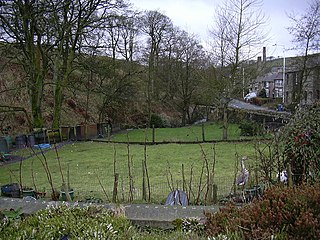
Broadclough – historically Broad Clough – is a village located to the north of Bacup, previously having been a part of the old borough of Bacup and now with Rossendale borough of Lancashire and part of the Greenclough Ward. It is part of the Rossendale and Darwen constituency, with Jake Berry having been the Member of Parliament since 2010. Like much of Bacup, Broadclough is rapidly becoming a commuter area for cities and towns such as Manchester, Burnley, Accrington, Preston, Blackburn, Rochdale.

Preston Town Hall is a municipal building in Lancaster Road in Preston, Lancashire, England. The town hall, which is the headquarters of Preston City Council, is a Grade II listed building.

Accrington Town Hall is a municipal building in Blackburn Road, Accrington, Lancashire, England. The town hall, which was the headquarters of Accrington Borough Council, is a grade II* listed building.

Farnworth Town Hall is a municipal building in Market Street, Farnworth, Greater Manchester, England. The town hall, which was the headquarters of Farnworth Borough Council, is a grade II listed building.
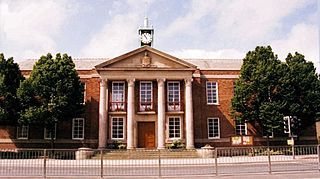
Padiham Town Hall is a municipal building in Burnley Road, Padiham, Lancashire, England. The town hall, which was the headquarters of Padiham Urban District Council, is a grade II listed building. It is the meeting place of Padiham Town Council.

Colne Town Hall is a municipal building in Albert Road, Colne, Lancashire, England. The town hall, which is the meeting place of Colne Town Council, is a grade II listed building.
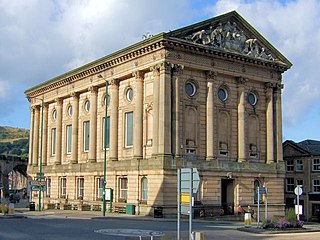
Todmorden Town Hall is a municipal building in Halifax Road, Todmorden, West Yorkshire, England. The town hall, which is the meeting place of Todmorden Town Council, is a grade I listed building.

Nelson Town Hall is a municipal building in Market Square, Nelson, Lancashire, England. The building is the headquarters for both Pendle Borough Council and Nelson Town Council.

Radcliffe Town Hall is a municipal structure in Spring Lane in Radcliffe, Greater Manchester, England. The town hall, which was the headquarters of Radcliffe Borough Council, is a locally listed building.

The Old Town Hall, sometimes referred to as the Moot Hall, is a municipal building in Church Street, Clitheroe, Lancashire, England. The structure, which was the meeting place of Clitheroe Borough Council, is a Grade II listed building.

Oswaldtwistle Town Hall is a municipal building in Union Road, Oswaldtwistle, a town in Lancashire, England. The building accommodated the Oswaldtwistle Civic Arts Centre until it closed in 2023.

Rawtenstall Town Hall is a municipal building in Bacup Road, Rawtenstall, a town in Lancashire in England. The building, which served as the offices and meeting place of Rawtenstall Borough Council and has been converted for commercial use, is a locally listed building.

